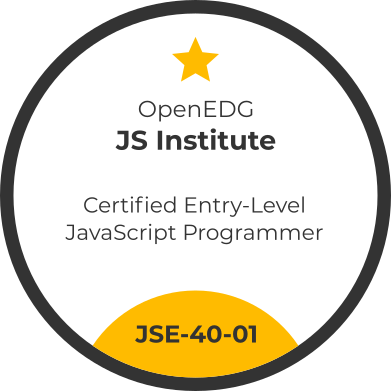About this course
JavaScript Essentials 1
This course is the first in a 2-course series, and it will prepare you for the JSE – Certified Entry-Level JavaScript Programmer certification exam.
The main goal of the course is to guide you from a state of complete programming illiteracy to a level of programming knowledge which allows you to design, write, debug, and run programs encoded in the JavaScript language, and to understand the basic concepts of software development technology.
The course focuses on the JavaScript language core concepts, including the essentials of the JavaScript syntax and semantics, best programming practices, JS tools and resources, and coding concepts such as variables, data types, type casting, operators, user interaction, control flow, functions, errors, exceptions, debugging, and troubleshooting.
The course will prepare you for jobs and careers connected with widely understood software and web development, which includes not only creating the code itself as a junior developer, but also web design, front-end development, and application testing.
You will learn
- Learn the universal concepts of computer programming
- Learn the syntax and semantics of the JavaScript language
- Practice skills in resolving typical implementation challenges
- Design, develop, and debug JS scripts
- Algorithmic and analytical thinking
- Best practices in programming
Course Syllabus
- How to communicate with the computer?;
- What is JS?;
- JS – Advantages and Limitations;
- Where is JS used today?;
- Development tools;
- Online development environment;
- Local development environment (code editor, interpreter, debugger);
- How can you run your JavaScript code?;
- Executing the code directly in the console.
- Naming, declaring and initializing variables;
- Declarations and strict mode;
- Changing variable values;
- Constants;
- Scope (blocks, shadowing, hoisting);
- Data types in JS;
- Primitive data types – Boolean;
- Primitive data types – Number;
- Primitive data types – BigInt;
- Primitive data types – String;
- Primitive data types – undefined;
- Primitive data types – Symbol;
- Primitive data types – null;
- Type casting – primitive construction functions – null;
- Type casting – primitive conversions;
- Conversion to String;
- Conversion to Number;
- Conversion to Boolean;
- Conversion to BigInt;
- Implicit Conversions;
- Complex data types – Object;
- Complex data types – Array;
- Array – the length property;
- Array – the indexOf method;
- Array – the push method;
- Array – the unshift method;
- Array – the pop method;
- Array – the reverse method;
- Array – the slice method;
- Array – the concat method;
- Single-line comments;
- Multi-line comments;
- Documentation;
- Code toggle.
- What are operators?;
- Assignment operators;
- Arithmetic operators;
- Arithmetic operators – compound assignment operators;
- Logical operators;
- Logical operators – compound assignment operators;
- String operators: concatenation and compound assignment;
- Comparison operators;
- Other JS operators (typeof, instanceof, delete, and ternary);
- Operator precedence;
- How to interact with the user in JavaScript?;
- Dialog boxes – alert;
- Dialog boxes – confirm;
- Dialog boxes – prompt.
- What is conditional execution?
- The if statement;
- The if–else statement;
- The if–else–if statement;
- The conditional operator;
- The switch–case statement;
- What are loops?;
- The while loop;
- The do–while loop;
- The for loop;
- The for–of loop;
- The for–in loop;
- The break and continue statements.
- What are functions?;
- Declaring functions;
- Calling functions;
- Local variables;
- The return statement;
- Function parameters;
- Shadowing;
- Parameter validation;
- Recursion;
- Functions as first-class members;
- Function expressions;
- Synchronous callbacks;
- Asynchronous callbacks;
- Arrow functions.
- Errors – the programmer’s daily bread;
- Natural languages and communication errors;
- Errors vs exceptions;
- Errors without exceptions;
- Limited confidence;
- Types of errors – SyntaxError;
- Types of errors – ReferenceError;
- Types of errors – TypeError;
- Types of errors – RangeError;
- The try–catch statement;
- Conditional exception handling;
- The finally statement;
- The throw statement and custom errors;
- What is debugging?;
- Step-by-step execution;
- Environment preparation;
- The debugger statement;
- The resume option;
- Code debugging without the debugger statement;
- The step over option;
- The step into option;
- The call stack option;
- Viewing and modifying variables;
- The step out option;
- TMeasuring code execution time.
Certification
JSE − Certified JavaScript Entry-Level Programmer certification shows that you are familiar with universal computer programming concepts like data types, containers, functions, conditions, and loops, as well as JavaScript programming language syntax, semantics, and the runtime environment.

Becoming JSE certified ensures that you are acquainted with the most essential means provided by JavaScript, which enable you to start your own studies at an intermediate level and to continue your professional development.
JSE certification allows you to demonstrate that not only are you up to date with JavaScript-related issues, but also that you can competently deal with them.
Furthermore, with the OpenEDG JS Institute, you gain access to a large network of JavaScript programming professionals, a valuable resource for solving JavaScript-related problems, and for developing innovative solutions.
Get your foot in the door with the JSE − Certified JavaScript Entry-Level Programmer certification. Land an entry-level programming job, break into the field, and gain the necessary skills, knowledge, and experience to advance your career.
More Information: JSE – Certified JavaScript Entry-Level Programmer
- Channel: Edube Interactive
- Sponsor: OpenEDG JS Institute
- Mode: Online self-study course
- Level: Beginner
- Cost: Free
- Study Time: 40 hours
- Language: English
- Associated Certification: JSE – Certified Entry-Level JavaScript Programmer (Exam JSE-40-0x)
Associated courses
JavaScript Essentials 2 (Intermediate)
Prerequisites
None